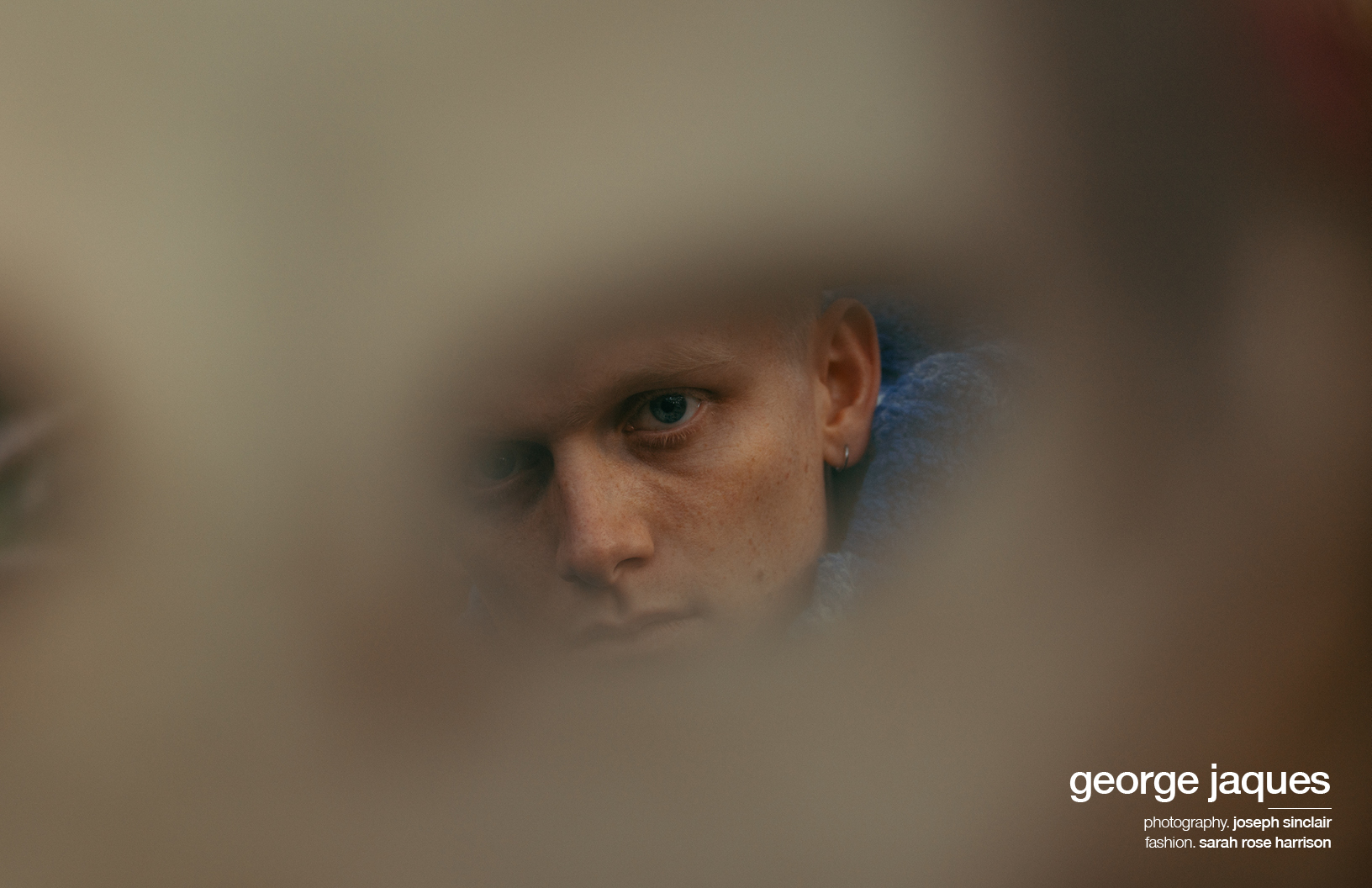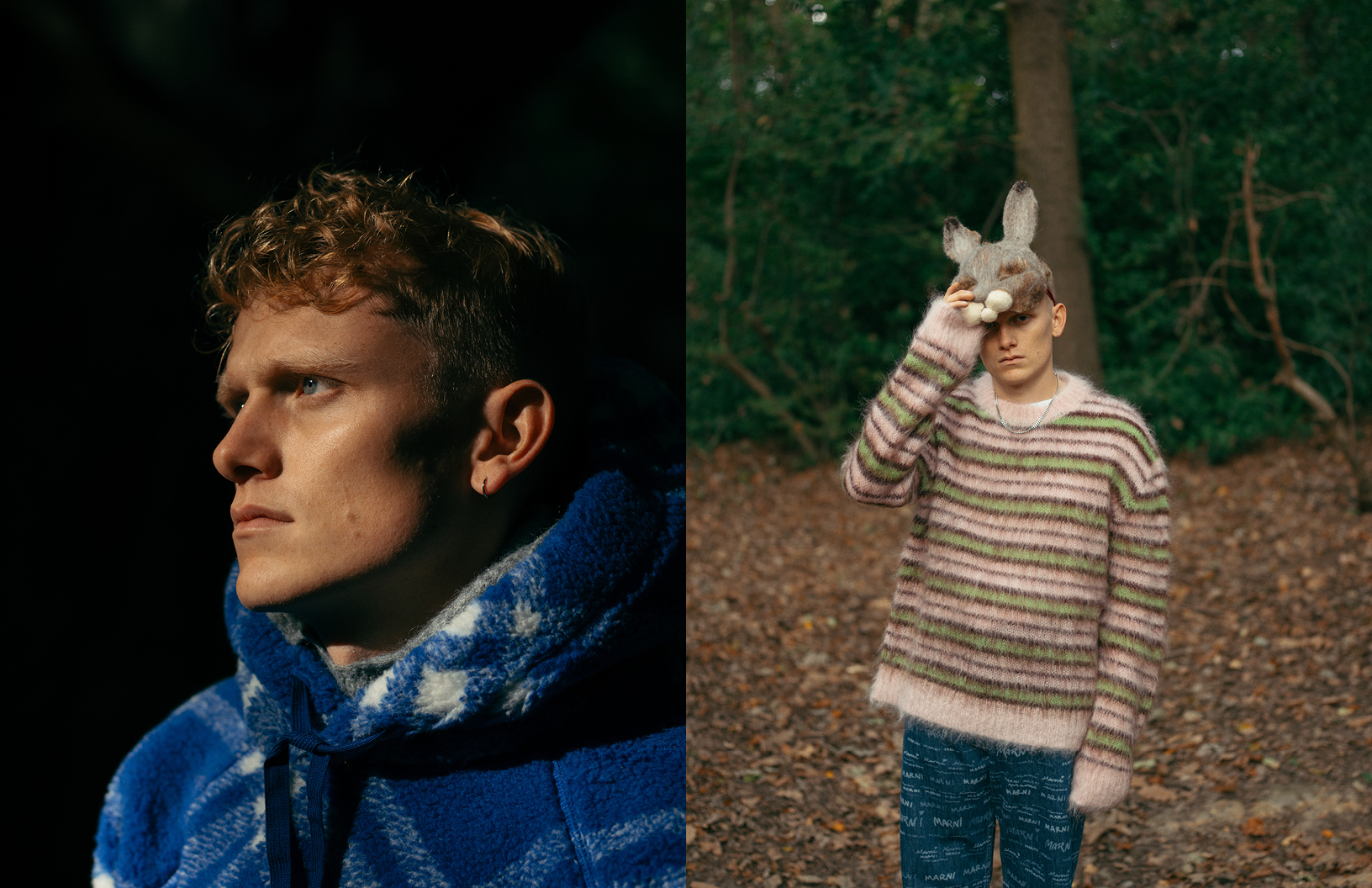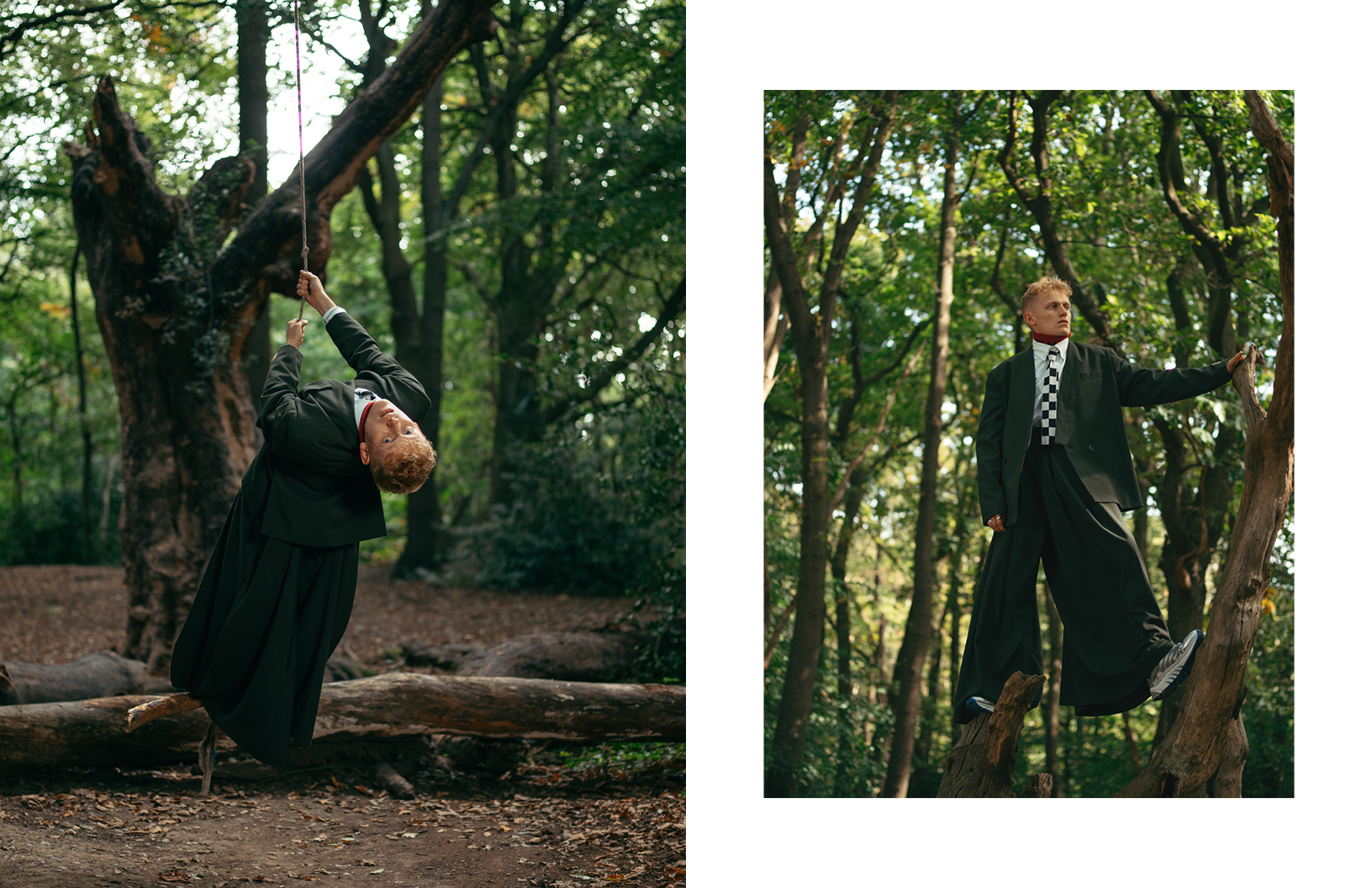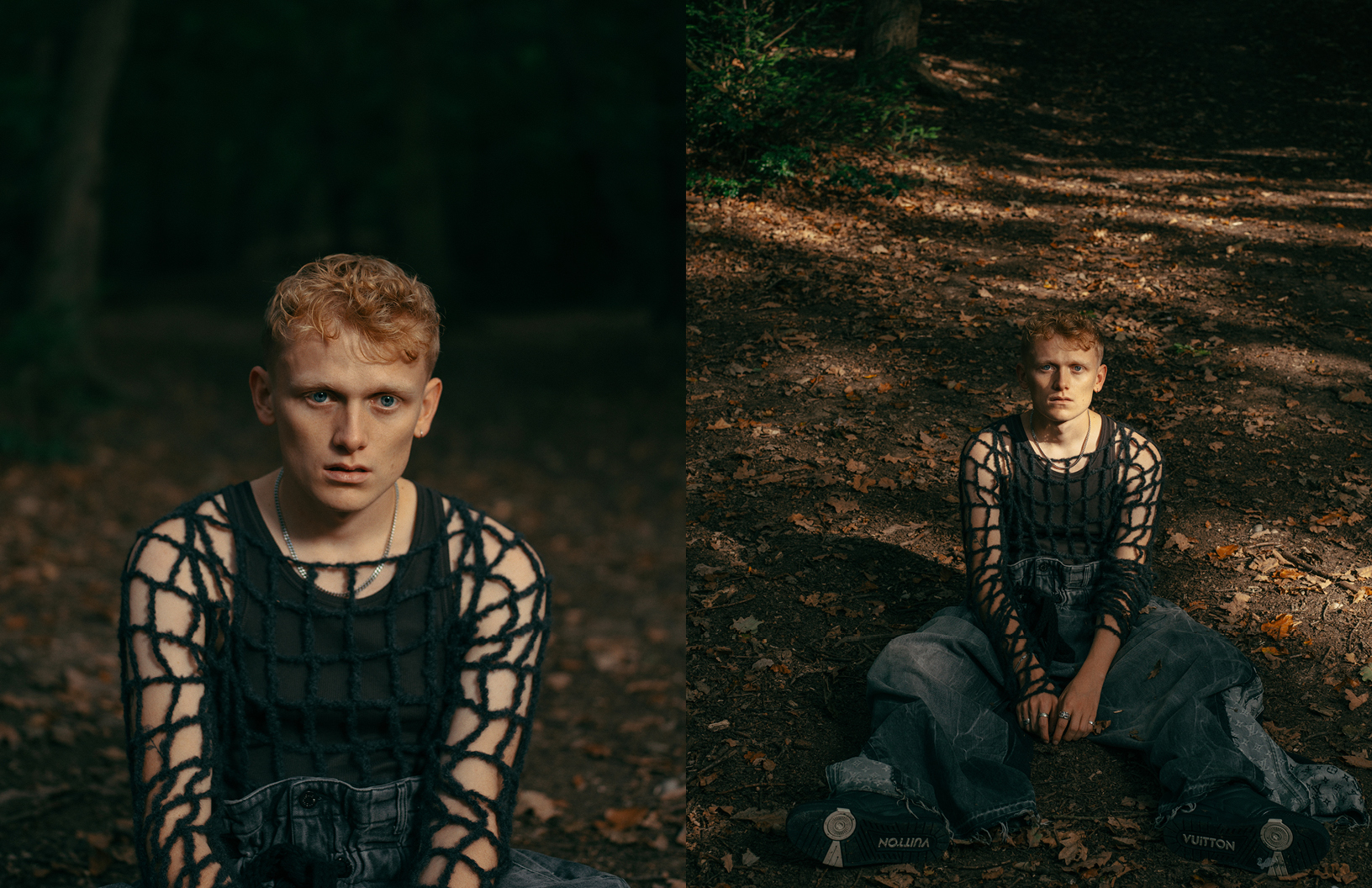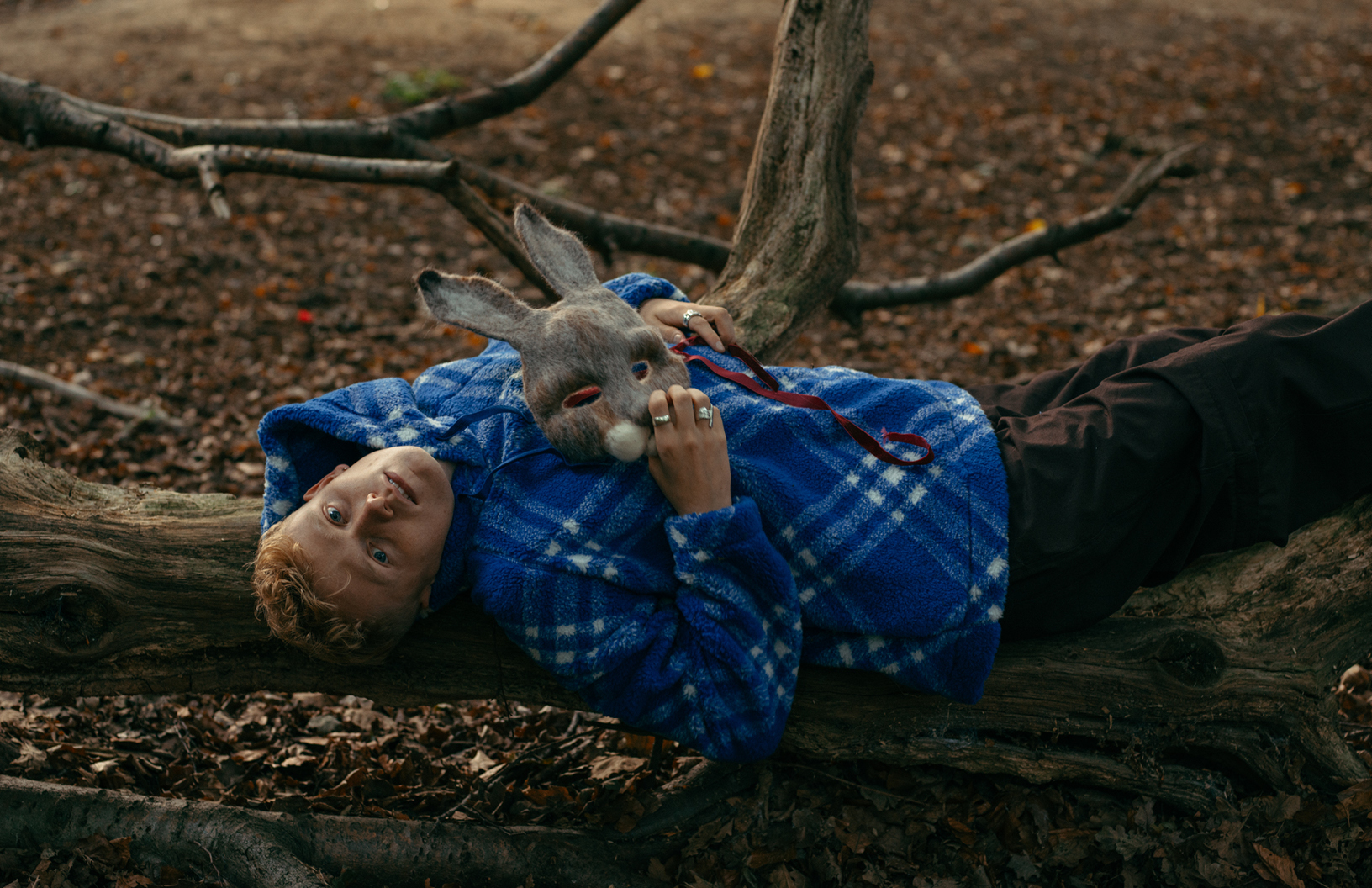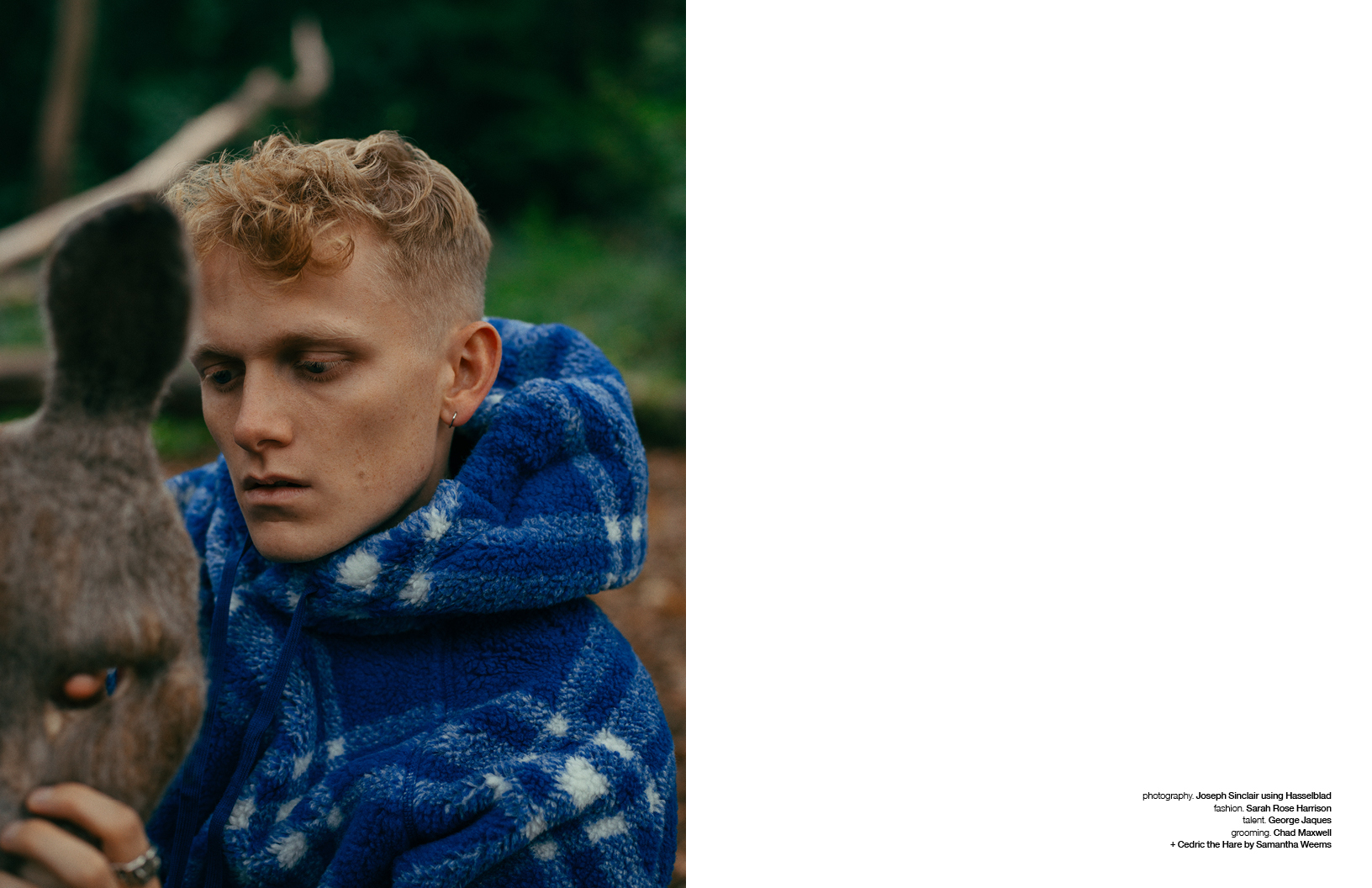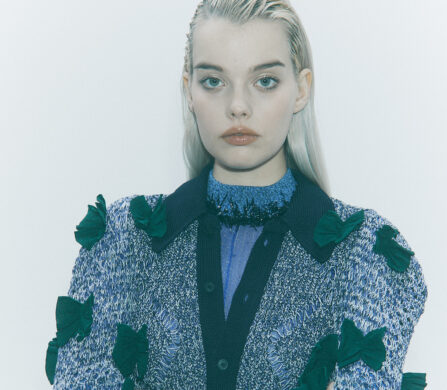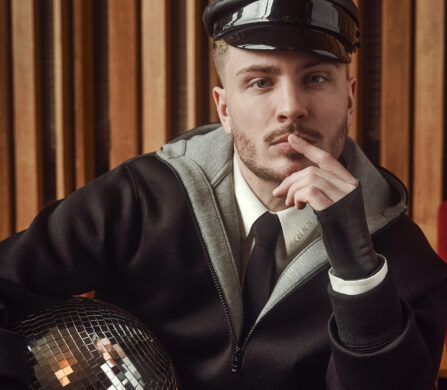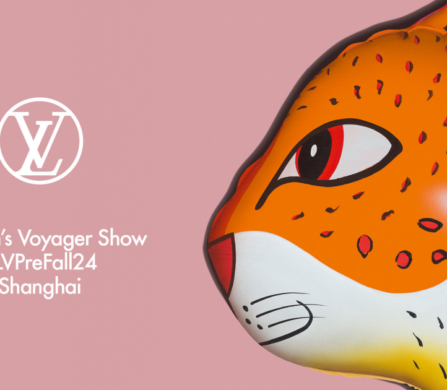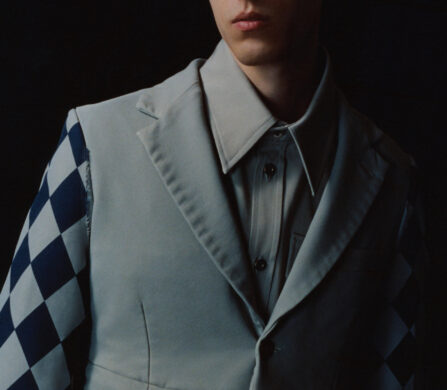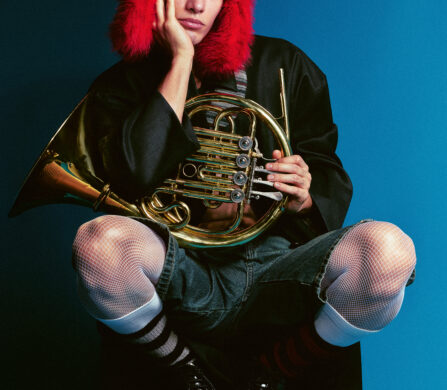At just 23, George Jaques has a resume that could be longer than some people’s entire professional careers. He’s an actor, writer, producer, and director, but most importantly: he’s a lover of film. Our chat is a long time coming — almost a year ago Jaques himself wrote me a message that was, to put it simply, overflowing with excitement about his directorial feature film debut, Black Dog, which had its premiere at the London Film Festival last month. Co-written alongside fellow actor Jamie Flatters when they were 18, Black Dog is a snapshot of youth and an ode to coming-of-age, a time when the freedom and anxiety that come with becoming an adult collide.
Unlike some of the nepo babies that breeze through the industry, Jaques didn’t have any fancy connections or familial ties to anyone that could give him a leg up, so he figured it out himself. He wrote the play Dilate based on the teenage drug culture he saw growing up in South West London, eventually staging it in an abandoned railway arch in London Bridge. After that, he wrote another play called Breathe and directed and co-wrote a short film called Silence. The desire and drive to support both his work and his fellow creatives is embedded within his DNA. At 16, he set up his production company, Athenaeum Productions, as a way to showcase and uplift those trying to break it in the film industry. Since then, everything Jaques has touched has been equal parts affecting and striking, giving audiences the chance to dive into his character’s minds and find solace in their shared experiences.
Black Dog is, truly, as good as everyone says it is. It’s a road trip movie that is so much more than that, tackling everything from toxic masculinity, sexuality, grief, eating disorders, and mental health but doing do with a deft touch. With powerful performances by Flatters and newcomer Keenan Munn-Francis, the story shows their characters embark on a drive up north as they slowly unravel the trauma that’s been trying to drown them. As a director and writer, Jaques never patronizes his audiences by giving them all the details. Instead, he lets all of the topics and themes sit front and centre and allow the audience to define (and redefine) what the film means to them.
In conversation with Schön! Magazine, Jaques discusses the importance of supporting independent films, why he will never take himself too seriously, and more.
The premiere of Black Dog happened on Saturday and it must’ve been a whirlwind for you. How are you feeling right now?
God, it was surreal as hell! [Laughs] When you work on something for so long, you’re so close to it. I wasn’t acting in this, I was writing, directing, and producing it, in addition to coordinating with the festival and sales agent. Then suddenly you’re in the car to Leicester Square and I have two bodyguards and it’s the most surreal thing. We don’t have Netflix money so I was terrified that we’d show up to the premiere and it would be me and no one else! At 5:40, everyone — like Louis [Partridge] and all my friends — showed up. I’ve felt quite old in this industry because I’ve been doing it for a long time. But when I introduced the film and looked up, I just burst into tears because I think that was the first moment where I felt overwhelmed by the reception. We got a double standing ovation which never happens, all of the London Film Festival team were saying they’d never seen anything like it. We had a big after party afterwards and celebrated and it just was amazing.
You mention wearing all of these different hats. I remember you messaged me about the film back in February so you’ve been so on it with promoting and pushing this film.
Yeah, I remember that! I think what happens in British independent cinema is that a lot of great films sneak under the radar. We weren’t backed by public bodies like when you make a film in America and are supported by a smaller studio. We have some amazing names in it, like Ruby Stokes and Paul Kaye and obviously Jamie [Flatters] and Keenan [Munn-Francis]. You have to keep pushing and caring because the moment you stop is the moment no one ends up seeing it. It’s hard because you are just trying to make sure it has the best launch it possibly can. The world premiere at the London Film Festival sold out in two minutes. It means that, when we do eventually do cinemas next year, everyone hopefully will think, ‘Oh, that is that ‘Black Dog’ film people saw at the festival.’
When you think back to 16-year-old George who started his own production company, how would you say you’ve grown and developed as an actor, writer, and creative?
You know, a part of me at the time thought that was a really normal thing to do. As an actor, the more you do it, the more you learn. Every project I learned so much more and that’s always the hardest bit — you finish a project and wish you could go back to the start with the experience you have now.
Yeah, and the people you meet while navigating these projects and experiences also help you grow, too. Obviously, you worked very closely with Jamie who starred in Black Dog, I believe you were 18 when you first started writing it.
Yeah, he was actually going to be in my first play and then he went on to be the lead in Avatar 2 and 3, which was fine I guess [laughs].
If he had to do it, I guess we can let that slide.
Yeah, yeah, exactly. When we were 18, all of our mates were at uni and we weren’t and we felt alienated being in London by ourselves in a very adult industry. We started writing about growing up in South London as a 17-year-old and that’s how Black Dog started.
It was meant to be a stage production first and then you decided to make a film, right?
At the time I did so much theatre and Jamie had done film, so I thought we’d write a theatre show but then we thought about it being a feature film and that was exciting. The beauty of theatre shows is that it doesn’t stifle your creativity. You’re not sitting around a table trying to figure out if you can shoot that weekend because of the weather or whatever. A road trip film for a debut feature is very ambitious because you change locations every day. We’d change places every day over a 22-day shoot and my location manager was shocked that we were able to do that for half a million quid to make it. As a 23-year-old, that’s so much money. As a film producer, that’s nothing. It was a big push and pull.
Did it feel like you were on a road trip too just by making the film and hopping from location to location?
We started in London and on the first day we started, Jamie and I had a photo shoot that morning. We got on set and then we did a week in London and then we did a week driving and then we were in Sheffield. It massively felt like we were going on the same journey which was quite cathartic, but then also incredibly intense. Then we did the drive in reverse as well on the way back to shoot all the bits between the scenes.
You had a full-circle experience.
Yeah, you go back to where you started. By that point, we had shot 22 days and we were exhausted and shooting whatever, like a pigeon on the side of the road or a bridge.
Doesn’t matter what it is, just get the content.
Exactly, just trying to capture the geography of the UK and getting the Newcastle sign and stuff like that! [laughs]
This film focuses on such a specific moment in someone’s life — the migration from childhood to adulthood and trying to figure out where they fit. It mimics the entire ethos of your production company which serves as a self-expression for young people. What is it about that period of time that is so intriguing to you?
I think it’s that moment where you’re caught between the security of childhood and the independence of adulthood. I’ve always been fascinated by that bit of time where you’ve had everything done for you and now you’re becoming independent. For some people that happens at 18 or 24. I feel like I’ve been fascinated by the idea of why teenagers act the way they do because they’re treated like children but expected to behave like adults. I feel when you look at characters and you create stories, that’s the most exciting thing to grapple with. Everyone kind of tells me that my USP is that I’m 23 and can write about being young without being 70. When I started the company, I was going through a lot and I think it was a real method of escapism for me. I wanted to bring a team of almost different actors from all different backgrounds and make some work that really excites us. That’s kind of changed now, now I just want to create good work with good people. I want to make work that makes you laugh or makes you cry. I started the company as a medium of expression and to give a voice to young people and creativity and I think that is still in the heart of everything I try to do.
Yeah, I read that your past work Breathe explored teenage suicide and Dilate focused on teen culture. With such universal themes that transcend any sort of geographical location or age, do you think your work is always going to orbit around them?
I wanted to focus on socially conscious subjects and try to make them entertaining but provoking. I wanted to dive into darker stuff and change people’s perspectives without ever trying to give people the answers. The moment you start saying ‘Don’t do drugs’ is the moment everyone checks out. I think Black Dog still has that, but I think it was my first step away from purely issue-led stories. There are issues within it, but there is no single-defining thing about the film. It’s not a film about mental health, it’s a film that includes and talks about mental health.
Yeah, I think the beauty of the film is that it’s hard to pinpoint exactly what it’s about because it’s about so many things. It’s an exploration of these two character’s lives and the things that they’ve experienced rather than one single theme or topic.
I feel like Sam’s character is the more obvious vulnerable character, but what I love about him is that he’s Black and middle class which you don’t see that often. I feel like that was such an exciting thing to do because why don’t we see more black characters that are middle class? Nathan isn’t your typical vulnerable kid, but then he’s vulnerable in so many other ways even if he puts on his hard front. I feel like that was a really exciting place to start. Like you said, it’s hard to pinpoint. I kind of explained it as a road trip about two boys from different backgrounds who meet by chance and unite in this need of having to go up north. It’s about the compassion and complexity of young men but also about loss, grief, love sexuality, friendship, and on and on.
“River” by Leon Bridges was such a perfect song choice to bring these two together and break down some barriers at the start of their trip. I loved that scene.
We didn’t know Keenan could sing! We knew he was a superb actor, but we didn’t know about the singing. I use music a lot because I get really awkward in rehearsals so that’s the way I try to make it a safe space for my actors. I do a lot of character work off-set and then we bring it to set. I’ll give shit notes and I’m apologizing all the time, but it just means that the actors feel relaxed enough to make mistakes. And sometimes mistakes are genius. I just asked him to belt out “River” and I knew as it was happening that it was going to be one of my favourite moments.
Were there any specific songs, films, or other media that you used as inspiration or cultural touchstones to bring Black Dog together?
I didn’t grow up watching films. My family liked seeing movies in the cinema and stuff but a lot of the highbrow stuff I didn’t see until later. I remember seeing Andrea Arnold’s film Fish Tank and that was a moment when British independent cinema was so exciting to me. I’d never seen a film like that and it kind of shook me and still sits with me. It’s so dark but so beautiful while also making you question everything about humanity and being young and the fragility of youth. I think that was a big touchpoint for me. I use music a lot as well. I make character playlists and I write to music. I use it in everything I do because it really affects your mood.
I don’t want to call it a favourite scene since it’s pretty bleak, but a scene I really appreciated was when Sam accidentally hits the dog. Obviously, he wants to hold on despite the dog’s suffering which ties back to the loss of his mother, whereas Nathan says that they should’ve been taking care of the dog, which goes back to how he feels abandoned by his own family. The conversation between the two of them feels so natural and fluid, was there room for improvisation while filming?
Because of rehearsals, they knew the scripts and their characters so well. For Keenan, because it was his first lead role in a feature, I spent so many days and stuff writing diaries of Sam and setting him up with people who would understand him really well. As an actor, I’ve always written diaries for my roles so I can read it in the morning and know that my character exists between here and here. Then you can just play and be free which is fun as an actor. I know I’m having fun when I don’t remember what I did in the take because I was just so present. That is where the magic is made.
For that day in particular, we had the script and we knew what the scene was. It’s always stressful when you’re directing the script you wrote because you imagine the perfect setting for it and then you have to adapt that vision as you go. I was listening to a talk the other day and they said a good director is someone who holds their vision no matter what, and I think a good director is someone who can adapt your vision and still get the thing that you need to get! [Laughs] For the dog scene, I managed to convince the Yorkshire council to shut a road and a dog prop turned up with a special effects guy who is a good friend of mine. The dog prop was breathing and my friend asked, “How shallow do you want the breath?” and I just thought, God this is dark!
In terms of improv, we would always shoot the script and then I’d tell them to have fun. I want them to embrace the environment that they are in, so if a pigeon walks on set — I don’t know what my obsession with pigeons is today but — if one walks on set, you have to react to it. You want to turn the moments of chaos into something exciting. In that scene in particular, it was longer originally I think and then I wanted to get to the heart of it and see the conflict between two boys who really, who really believe they’re right. I don’t think Nathan’s doing a bad thing and I don’t think Sam’s doing a bad thing. I think they’re just both doing something that they think is kind. There was a screening yesterday and I was meeting some of the people who watched it and they were like, “Yeah, I would have done the same, I would put the dog down” and others thought that was insane.
A few scenes later when they called the owner, I felt genuinely stressed and anxious on their behalf!
Those days were hard shooting on a motorway in a scene with headphones, watching it over on a screen. I think what was really interesting the other day was someone said to me is the thing that they found so distressing was less the killing of the dog and more to do with these two wildly different characters in a car and they can’t escape. It almost felt cruel in moments and I thought that was really interesting because I love the fact that they’re not able to just run away. As a director, I was so cautious because if you push Sam too much, he’s just going to say get out and leave Nathan on the side of the road.
I read a piece you wrote for Little Black Book and you touched on advice you think about often which is “take the work seriously but don’t take yourself too seriously.” How did you instill that mindset into the filming process of Black Dog?
The way I work is I get the best people around me — I get the experts — and I let them be experts. I say that quite a bit because I’m bringing this incredible first assistant director in because he’s amazing and way better than me, and I think that’s like a really humbling process. I try to be one of the least experienced on set because then you learn and have fun as you go. My sets are always super fun but everyone knows we have to work hard. We work hard, we push in the right direction, and then we’ll all go to the pub. I’ve always been like that — I’d take the work very seriously but I also don’t take myself too seriously because you got to be able to have a laugh. It’s such a privilege doing what we do and it’s incredibly hard at moments. For The Serpent Queen, I got to put on white tights and it was kind of surreal being in Marseille and walking around on set. I think the nicest people in this industry are the ones that know they are so lucky to do what they do but want to do a really fucking good job at it.
You really have zero ego, it’s really refreshing. Having experienced people around you just helps you become more experienced, too.
I just always feel like I learn so much every day. My company is seven now and I’ve been directing for a long time and acting for a long time. It’s a big chunk of my life. It’s almost a third of it. I’ve been doing this and running the company and at first I wanted to do all of it but now it depends on the project. I don’t want to direct every project I do. I don’t want to act on every project I do. Sometimes it’s best if i just executive produce instead. I think I can feel if I need to act or I need to direct this. There are some stories that aren’t mine to tell, too, and I’m very conscious about that. I was sent a script the other day and I said to them that it is a beautiful piece, but you should be finding a female director who knows this world better than I do. Some stories you just feel like you can tell and then some that you know need to be with someone else.
What is some advice you’d give from yourself to Sam and Nathan?
I always say the moment you experience grief for the first time is the moment you grow up. I think one of the first things I’d say to them is that it’s important that you both go to therapy and work through it because you owe it to yourself and to the people that you are in rooms with down the line. I’d also probably tell them to stay in touch. I know it sounds really stupid, but I think they really needed each other at the beginning of that film. By the end, they’ve grown and you never know if they’re gonna need each other again.
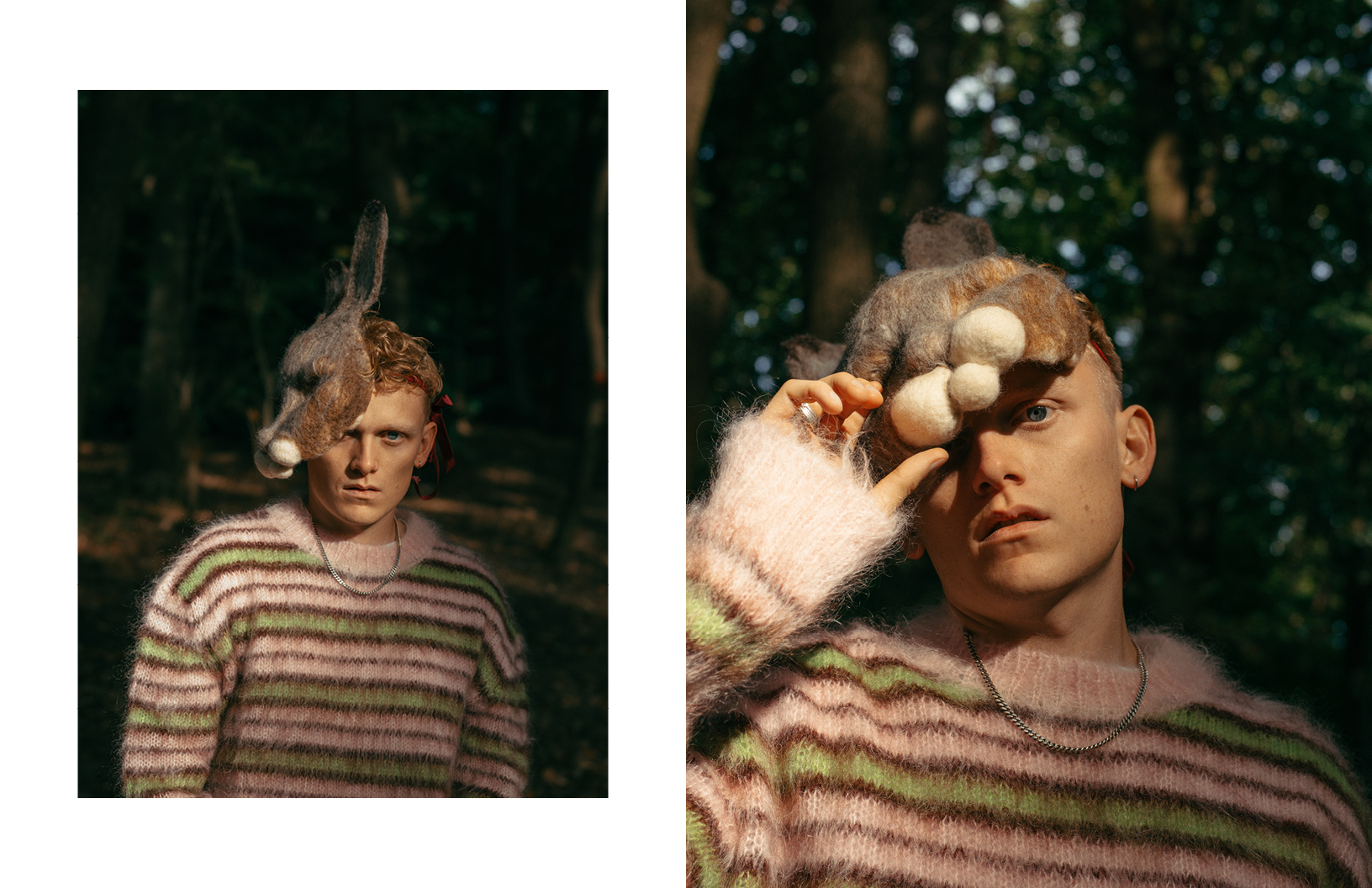
jumper + jeans. Marni
t-shirt. Sunspel
necklace. Talent’s Own
opposite
jumper + jeans. Marni
t-shirt. Sunspel
necklace. Talent’s Own
What do you think happens next?
I’ve got my own idea. I can imagine Nathan is going to set up a garage by his sister and Sam will go to uni. People have told me that they hope Nathan gets accepted by his sister at the end of the film or that they hope Sam goes and has a good chat with his dad and they get super close, and I think that’s amazing. I want this film to be what it is for you. Even the moment they woke up next to each other, I was doing a q&a after the screening and the young man in the audience said he had hints of a queer romance and I thought that was great because if that’s important for you, and then they did sleep together. I feel like that was quite scary, though, when you’re not describing everything that happened. You’re giving so much space to the audience. There’s part of me that wants to be like, this is how you should be feeling the whole way through, but that’s not good filmmaking.
Lastly, if you could manifest something for yourself for this year, what would it be?
This is my pathetic response but this year is beyond what I thought it would be. The response to the film has been the most amazing thing so I feel incredibly lucky. We started working on a new feature, we have some stuff that we’re working on, but if I had to manifest it probably wouldn’t be work-related. I’d just like to have a really nice Christmas and have some time off.
You deserve it after all the work you’ve been putting in, my friend!
Thank you, thank you. It’s all been worth it.
photography. Joseph Sinclair using Hasselblad
fashion. Sarah Rose Harrison
talent. George Jaques
grooming. Chad Maxwell
interview. Kelsey Barnes
+ Cedric the Hare by Samantha Weems














